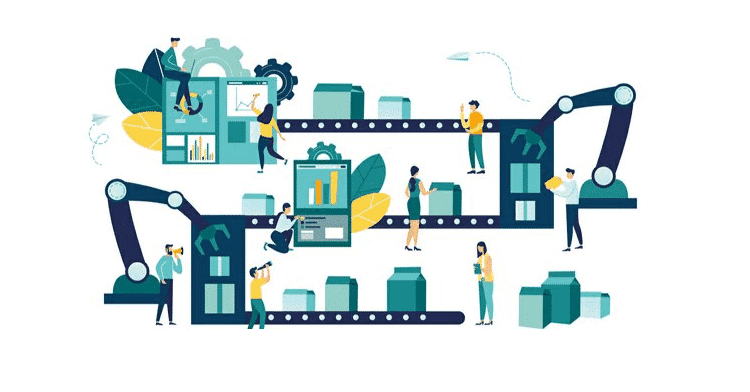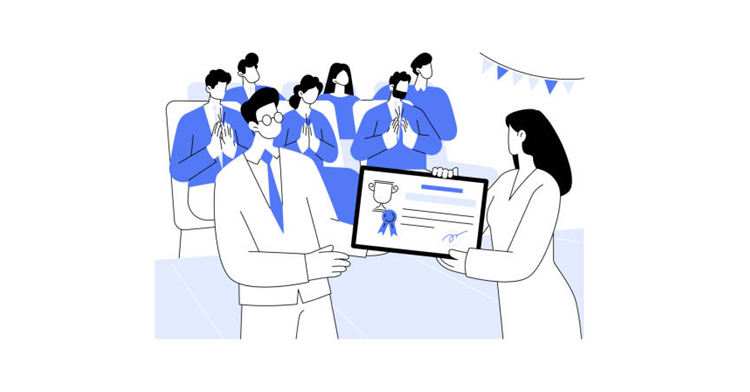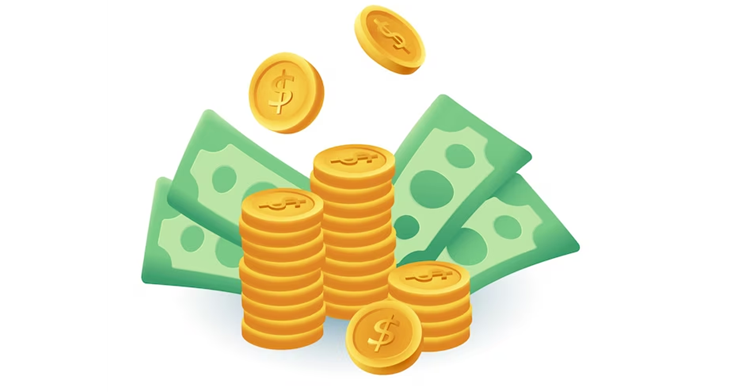1. Employee rewards programs must be tailored to each industry to meet specific workforce needs and business goals.
2. In manufacturing, tangible rewards like cash bonuses and safety awards motivate blue-collar workers.
3. Technology companies benefit from rewards that promote innovation, peer recognition, and flexible digital platforms.
4. In consumer goods sales, performance-based incentives, sales contests, and cash awards drive motivation among sales teams.
5. Retail companies focus on customer experience, and to motivate customer-facing employees, they offer instant recognition, cash rewards, and time off.
The importance of rewards and recognition for building a highly motivated workforce is well known. Here are a few examples of employee rewards programs in organizations in different industries:

Manufacturing companies play an essential role in the economy.
Due to rapidly growing competition, such organizations must focus on productivity, quality, and operating costs.
Also, such companies must comply with several health, safety, and environmental regulations.
Hence the focus is to keep their workforce motivated, productive, healthy, and safe while ensuring compliance with regulations.

A large percentage of the workforce in a manufacturing company comprises blue-collar employees.
They include shop floor workers, production, maintenance, quality control, and logistics staff.
Hence, these organizations face the challenge of rewarding and recognizing various skilled professionals.

Tangible rewards, such as cash awards, performance bonuses, trophies, and gifts are preferable.
Giving financial rewards as a token of appreciation for their hard work and dedication can motivate them further.

Certificates and citations applauding the good work of the employees are a good way to keep them motivated.
These should be presented at a formal event to make them more impactful.

Rewarding tenured employees is an effective way to boost their motivation and that of others.

A manufacturing company needs to appreciate the safety initiatives of employees to create a safe work environment.
Safety awards also reflect the commitment and concern of the organization towards its employees.

Manufacturing organizations should recognize and reward employees from each department for their consistently high performance.
These department-specific awards ensure maximum coverage within the organization.

Receiving an award in the presence of their co-workers and families can enhance their sense of pride and achievement.
Hence, happy memories of such events keep the employees inspired for years.
Also read: Case Study of Employee Recognition at a Manufacturing Company

Technology companies have been driving digitization and automation.
They deliver software products and platforms that make businesses more efficient and profitable.
The employees of a technology company are generally working under high pressure to deliver projects with tight deadlines.
Hence, such organizations must create a reward and recognition program that keeps employees happy and motivated.

The employees working in a technology company are generally highly qualified white-collar professionals.
They include developers, analysts, project managers, tech support executives, etc.
These professionals are incredibly tech-savvy and like to stay connected all the time.

Reward programs in a technology company should focus on promoting employee innovation.
They should also motivate employees to deliver projects within tight timelines and with the highest levels of quality.

Using a program on an engaging digital recognition platform can be beneficial for a technology company.
Such programs are likely to be perceived to be more exciting and motivating to tech-savvy employees.

Peer-to-peer recognition has emerged as one of the most effective methods of employee recognition.
Hence, this assures employees of their co-workers’ support and helps build a more profound sense of belonging and engagement.

Rewards programs in a technology company should include both monetary and non-monetary awards.
This ensures both financial benefit and emotional satisfaction for the employees.

Adding value to the employees’ careers through rewards is another option technology companies can consider.
Hence, organizations may consider sponsored training programs or employee special assignments as rewards.
Such initiatives can enable them to develop new skills and advance their careers.
Also read: Case Study of Employee Recognition at a Global Tech Company

A consumer-goods sales company needs to operate client-focused to ensure business success.
Organizations must stay updated about customer needs, market trends, and opportunities.
Such organizations focused on sales and marketing should design their employee rewards programs accordingly.

Most employees working for consumer goods organizations are involved in selling and marketing various products or services.
These include profiles like sales executives, sales managers, regional marketing heads, and so on.
The professionals are qualified and experienced in field sales, interpersonal skills, customer relationship management, and various sales-related tools.

Sales is a performance-driven profession that requires employees to be self-motivated and exceptionally committed.
Hence sales organizations need to reward executives with the highest sales numbers to drive their motivation.
These employee rewards programs based on performance can drive salespeople to achieve seemingly impossible targets.

One way to enhance the motivation of salespeople through healthy competition is to organize sales contests.
Such contests should have challenging targets and attractive rewards to motivate employees to compete and achieve those targets.

Sales-based incentives are a traditional method for consumer goods companies to reward their high-performing employees.
Such incentives can drive a high level of performance among salespeople.

Cash rewards work well in a consumer goods/sales company to motivate employees to perform better.
Such rewards can make them feel genuinely valued for contributing to business growth.
Organizations can also offer appreciation certificates and citations along with cash awards.

Organizing grand award ceremonies can help increase the impact of the rewards manifold.
Organizations should formally recognize the efforts and achievements of their star performers at a grand event, held quarterly or annually.

Rewarding their salespersons with sponsored trips or vacations can make them feel truly valued.

Retail organizations act as the links between manufacturing companies and their customers.
They play an essential role in providing products and services to customers conveniently and efficiently.
The employees of retail stores, shopping malls, and restaurants need to engage with customers directly and ensure their satisfaction.
Hence, appropriately rewarding them is the key to maximizing the company’s success.
A customer service/retail company’s employees must interact with customers regularly.
Their roles include front desk staff, customer service executives, delivery persons, helpers, maintenance technicians, and other grey-collared employees.
These skilled and semi-skilled employees form the front-line staff of the organization.


Customer experience should be an important criterion in a rewards program for customer-facing staff in retail.
This will ensure such employees work hard to ensure the happiness and satisfaction of customers.

Instant recognition is effective for customer service organizations to appreciate the good work of their employees.
It can be a simple “thank you,” “well done,” or “keep up the good work” message.
Organizations can also provide spot rewards, such as gift vouchers or cash prizes, to boost employee motivation further.

The employee of the month reward is a common practice in retail. It has been known to impact employee performance and engagement significantly.
Such recognition gives employees a sense of pride and achievement and motivates them to continue performing well.

Cash awards hold value for grey-collared employees working in retail as their incomes are likely to be low.
Hence, even small cash rewards can be perceived as lucrative and motivate such employees to perform better.

Retail employees feel happy to receive appliances or gadgets as rewards due to their functional and aspirational value.

Since retail and consumer service employees get limited leaves, additional leaves or time-offs can be effective rewards.
Also read: Case Study of Employee Recognition at a Retail Company
The various examples of employee rewards programs provide generalized frameworks for organizations to design programs suited to their industry type and maximize the outcomes of such programs.

Lead author: Sagar Chaudhuri, the Co-Founder and CEO of HiFives. He is an HR Tech Evangelist with over 25 years of corporate and entrepreneurship experience. In the past, Sagar has worked in leadership roles with companies such as Genpact, Infosys, and ICICI Bank. He has an engineering degree from IIT Kharagpur and an MBA from IIM Lucknow. Connect on LinkedIn
To stay updated on the latest HiFives blogs, follow us on Twitter (@MyHiFives)